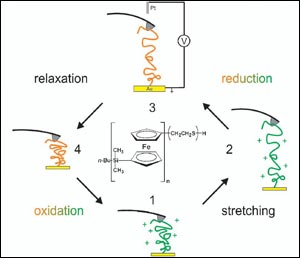Single molecule motor inspired by natural energy conversion

The cycle of oxidation and reduction, causing soft/hard transitions within the molecule. The associated stretching and shrinking gives the mechanical energy. The forces are monitored by the tip of an Atomic Force Microscope, on top of the molecule. The bottom of the chain is fixed on a gold surface.
A single molecule working as the nano scale version of the steam engine: that’s the molecular motor developed by a group of UT scientists led by prof. Julius Vancso of the MESA+ Institute for Nanotechnology. Natural ‘motor molecules’, capable of converting chemical energy into movement, have been the source of inspiration for this new synthetic version: a polymer molecule that stretches and shrinks caused by redox reactions. The results appear on the cover of Rapid Macromolecular Rapid Communications of January 23 .
In nature, some proteins are capable of converting chemical into mechanical energy, by burning ‘fuel molecules’. The synthetic version now presented is a polymer chain, fixed on a surface on one side. Fully stretched, this molecule is a few tens of nanometers long. A cyclic process can be started, in which parts of the chain alternately harden and soften. The result is an amount of mechanical energy, sufficient for driving future nano devices like pumps, valves and levers.
Iron
Just like in nature, redox reactions are the basis for the working principle of the engine: during reduction and oxidation, electrons are interchanged. To stimulate these reactions, iron is introduced within the polymer chain (PFS: polyferrocenydimethylsilane). This iron is alternately oxidized and reduced when the chain is put on a suitable voltage level. This cyclic process causes the soft/hard transitions and the shrinking and stretching of the chain. The researchers now use an atomic force microscope to be able to sense the forces and to get hold of the molecule on the top side. They estimate the efficiency of the conversion to be ten percent. Compared to conversion processes in nature: using photo synthesis, plants convert energy with an efficiency of 13 percent, and the estimated efficiency of the conversion of the chemical energy of food within the human body is about five percent.
A major additional advantage of the new molecular motor presented is that it can be positioned very accurately and controlled on a surface. In this way, it is possible to create a true array of engines and connect the nano devices to them. The distance between the motors can be kept very small. In light-driven nanomotors earlier presented, the minimum distance was limited by the wavelength of the light used, for example.
Media Contact
More Information:
http://mtp.tnw.utwente.nlAll latest news from the category: Physics and Astronomy
This area deals with the fundamental laws and building blocks of nature and how they interact, the properties and the behavior of matter, and research into space and time and their structures.
innovations-report provides in-depth reports and articles on subjects such as astrophysics, laser technologies, nuclear, quantum, particle and solid-state physics, nanotechnologies, planetary research and findings (Mars, Venus) and developments related to the Hubble Telescope.
Newest articles

Webb captures top of iconic horsehead nebula in unprecedented detail
NASA’s James Webb Space Telescope has captured the sharpest infrared images to date of a zoomed-in portion of one of the most distinctive objects in our skies, the Horsehead Nebula….

Cost-effective, high-capacity, and cyclable lithium-ion battery cathodes
Charge-recharge cycling of lithium-superrich iron oxide, a cost-effective and high-capacity cathode for new-generation lithium-ion batteries, can be greatly improved by doping with readily available mineral elements. The energy capacity and…

Novel genetic plant regeneration approach
…without the application of phytohormones. Researchers develop a novel plant regeneration approach by modulating the expression of genes that control plant cell differentiation. For ages now, plants have been the…





















